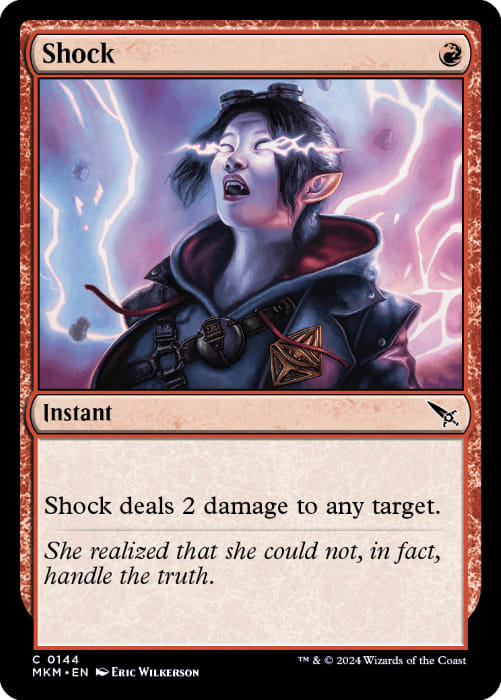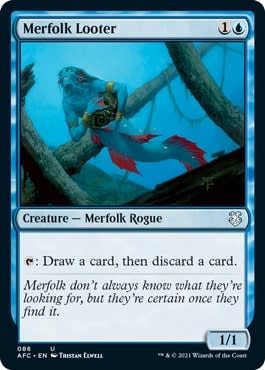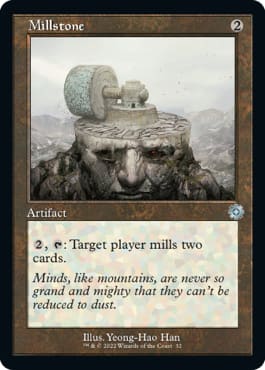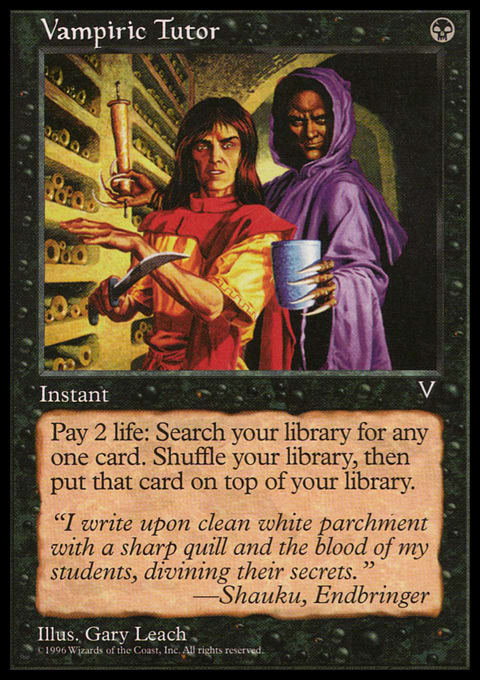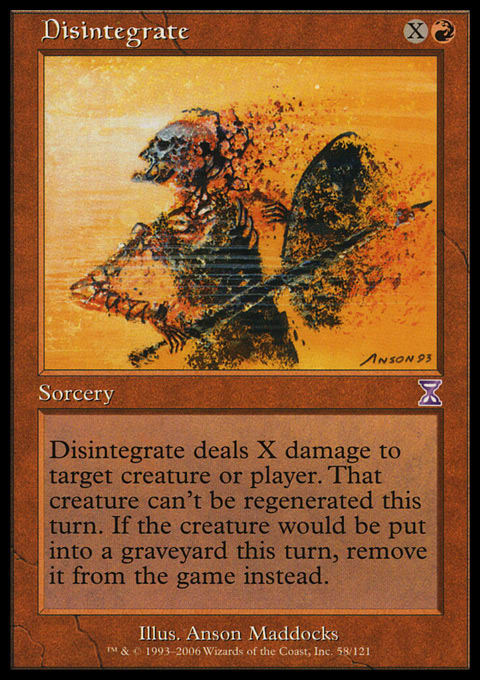Magic is a deeply complex game, boasting a rule book approaching 300 pages. The number of keywords, mechanics, and abilities is staggering in nature. I respect any newcomer to the game who undertakes the endeavor of learning the rules sufficiently to play at their kitchen table.
Wizards of the Coast helps make the rules a little more intuitive by implementing keywords that are descriptive in nature. It's easy to understand and remember that a creature with flying can only be blocked by other creatures with flying, for instance, because one can readily picture a bird or dragon flying over the head of ground creatures. It all makes sense.
Other times, players utilize their own shortcut terms to represent a specific ability or mechanic. These terms are sometimes not invented out of thin air--instead, they take their inspiration from previously printed cards, often those that first debuted the ability. Terms like "loot, shock, and rummage" all take their nicknames from cards from early Magic.
Let's look at some of the most iconic cards that helped established jargon used during modern games of Magic.
Shock
If you've played Magic during any of the Ravnica sets (original Ravnica, Return to Ravnica, Ravnica Allegiance) you've likely heard the term "Shock Land." This refers to the cycle of ten dual lands that can enter the battlefield untapped if you're willing to take two damage. Did you know that this shortcut for this land cycle derives from an actual card named Shock? I'm sure you did, considering the card was just recently reprinted in Murders at Karlov Manor.
Did you also know where this card first appeared? This card dates all the way back to 1998, with the release of Stronghold! That's over 26 years ago!
The card's text is simple in nature: two damage to a creature or player. Meant to be a powered down Lightning Bolt, Shock has become a mainstay in Magic. Because of its ubiquity, any card that also does two damage to a target is said to "shock" something. This includes cards with Shock in their name, including Shock Troops, Spellshock, Staggershock, and Sudden Shock.
Loot
How many cards contain the rules text, "Draw a card, then discard a card?" I ran a quick Gatherer search and found 133 matches. That number may not be perfectly precise, but I wouldn't doubt for a second that the correct answer is well over 100. This type of effect has been around in Magic for many years now.
Do you know where the term "loot" actually came from? It's not actually a mechanic, though players are so familiar with the term now that I think Wizards of the Coast could make it an official mechanic and no one would blink an eye. The ability was made famous by Merfolk Looter, printed all the way back in Exodus in 1998.
This 26-year-old card has seen reprints many times over the years: Seventh Edition, Tenth Edition, Magic 2010, Magic 2012, Eternal Masters, and even Masters 25. The card gained a new creature type and has evolved to be a Merfolk Rogue, but it has carried that same card draw and discard text for all these years.
Whenever a player draws and then discards a card, they can use the shortcut term "loot" to simplify the game action. Even though this isn't an official mechanic in Magic, I wouldn't feel bad using the term. Wizards clearly has no qualms using "looter" to imply this effect either--that's what drove the names on cards like Artful Looter, Cephalid Looter, Dragonborn Looter, Faithless Looting, Likeness Looter, Looter il-Kor, Marauding Looter, Shipwreck Looter, and, very recently, Shoreline Looter.
Mill
The Mill keyword has officially been around since Core Set 2021. Actually, there was one Mystery Booster playtest card called Truth or Dare that officially debuted "Mill" as a keyword.
On the 2019 playtest card, Wizards defines "mill" in reminder text. "To mill, put the top card of that library into its owner's graveyard." When Wizards of the Coast started printing many more cards with this kind of effect, they realized they could save space in the rules box by shortcutting all those words with a simple one: mill.
Why did they choose "mill" as the keyword name? It's not like the concept of a mill readily brings to mind the practice of taking cards off a library and putting them into the graveyard.
It turns out the answer goes back a long ways, all the way to Antiquities in 1994! Everyone, please meet the original mill win condition, Millstone:
This artifact inspired the shortcut "mill" term, officially adopted by Wizards of the Coast just a few years ago. This Antiquities card has the simple effect of milling two cards from a player's library for two mana, usable once per turn (hence the "Mono Artifact") terminology, since replaced by the tap symbol.
What would the rules text be in today's environment? We only need to look to the Brothers' War printing: "Target player mills two cards." The new terminology reduced the number of words from sixteen to five. Elegant in nature and, thanks to the card's popular history, the keyword is intuitive enough for most players to readily understand.
Rummage
When a player loots, they draw a card first and then discard after. If they have no cards in hand when the loot is activated, they essentially end up milling their top card.
Is there an ability that switches up the order to avoid the downfall of simply milling a card when playing hellbent (i.e., no cards in hand)?
It turns out there is! The effect is called "rummage," and the rules text states that you must discard a card in order to then draw a card. According to the rulings on Gatherer, the discard is part of the activation cost for the rummage ability. If you don't have a card in hand to discard, you can't activate the ability. The text appears on many cards, but one of the most prevalent appearances would be on Blood tokens.
Thanks to the invention of blood tokens, rummaging is quite common in modern day Magic. Like mill, a newcomer to Magic may be confused about where the term "rummage" comes from. A rummage sale sort of involves selling unwanted things, but it doesn't scream "discard a card and then draw a card."
This nickname doesn't go back nearly as far as the previous examples. The ability to discard a card in order to draw a new one was nicknamed "rummage" thanks to its appearance on Rummaging Goblin back in Magic 2013.
The goblin has since been reprinted numerous times, and as recently as Jumpstart 2022. We see rummage type effects frequently in Magic, but Rummaging Goblin receives credit for shortcutting the ability's text for players.
Tutor
The ability to search one's deck for a specific type of card, or for any card, can be one of the most powerful and broken things to do in Magic. Commander specifically is riddled with these types of effects.
When describing a card that lets you search your library for a card and then place into your hand (or on top of your library), are there any shortcuts to make life easier? Of course there is: the effect has been nicknamed "tutor," inspired by Magic's original tutor printed all the way back in Alpha: Demonic Tutor.
It may seem like a mana disadvantage to have to pay two mana to swap cards, but it turns out the ability to search through your deck for exactly what you need at that point in time is quite broken. In fact, some tutors have been banned in Legacy for their sky-high power level (Demonic Tutor, Mystical Tutor).
Most cards that have this "search your library for a card and place into your hand / on top of your library" rules text actually have "tutor" in their name: Diabolic Tutor, Vampiric Tutor, Worldly Tutor, Idyllic Tutor, Enlightened Tutor, etc. There are some exceptions to this rule. However, if someone were to ask me what Imperial Seal does, I'd simply say it's a sorcery-speed Vampiric Tutor.
Occasionally, there's a card that lets you search for something very specific. Sylvan Scrying, for example, lets you search your library for any land to place in your library. In these cases, players may explain the card's rules text as "tutor for any land." It's shorter and easy enough to understand to be a useful shortcut when playing a casual game of Magic.
Honorable Mentions
There are surely piles of cards I missed in this article. To try and be more inclusive, here are a few more I thought of in shortform:
- Fog: to prevent all combat damage (Fog, Spore Frog, Moment's Peace, Constant Mists)
- Bounce: to return a creature to its owner's hand (Man-o-War, Bigfin Bouncer, Waterfront Bouncer)
- Exile: to remove from the game - this is an official term in Magic, but I like to think the term was inspired by the Alliances card with the same name (see image below)
- Regenerate: another official ability that states the next time a creature would be destroyed this turn, it isn't and instead you tap it and remove all damage. There's actually a card called Regenerate (Magic 2010), but the original creation of the term was on Alpha's Regeneration.
- Clone: to copy a permanent, usually a creature. The original card from Alpha was called Clone, but we've seen the effect show up on numerous cards such as Sakashima the Imposter, Phantasmal Image, Body Double, and Spark Double.
Wrapping It Up
In hindsight, I could have expanded this topic to span multiple articles as part of a series. Shortcutting terms such as tutor, clone, and bounce are used frequently in casual Magic play. It could be helpful to explain where these terms originally started because it makes their mechanics more intuitive and recognizable.
This will have to conclude my list for now, but don't be surprised if there's a second installment down the pipe. Perhaps the next series will be slightly more obscure terms, with niche applications. With something like 17,000+ unique game pieces, there are bound to be many ability nicknames created as shorthand for the game. Otherwise, cards would be much wordier and discussions about the game with friends much lengthier.
I'll always remember, before exile was a thing, my friends and I would joke about cards like Disintegrate being too wordy for their own good.
Instead of simply saying that a creature that dies after taking damage from Disintegrate is exiled, the card explains "...it is removed from the game entirely..." Entirely? As opposed to partially removed?
All I can say is I'm thankful for standardized card text and these handy shortcuts to make the game easier to play and explain.
















